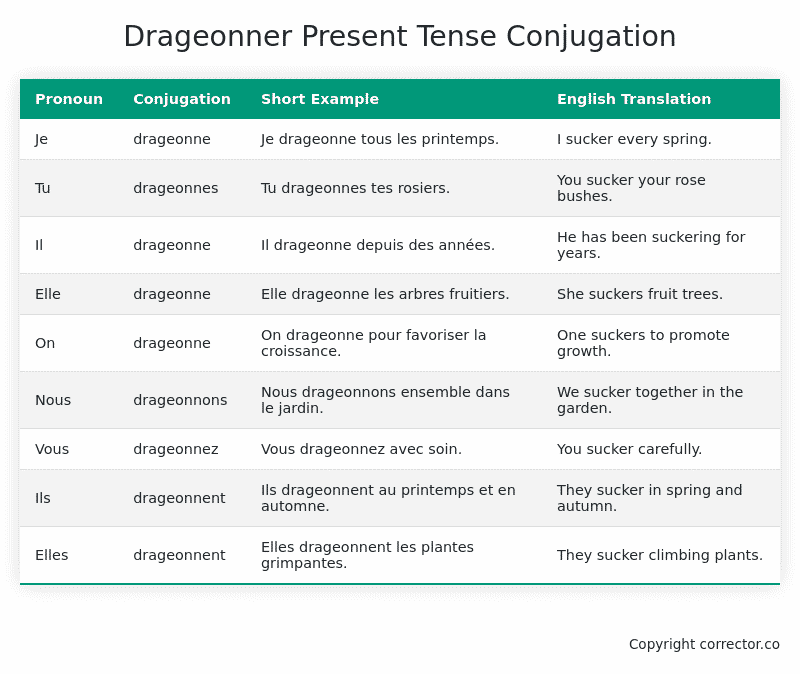Le Present (Present Tense) Conjugation of the French Verb drageonner
Introduction to the verb drageonner
The English translation of the French verb “drageonner” is “to sucker” or “to sprout.” The infinitive form “drageonner” is pronounced as “dra-juh-nay.”
The word “drageonner” comes from the Old French word “dragon,” meaning “shoot” or “branch.” In everyday French, “drageonner” is commonly used in gardening contexts to describe the action of a plant producing new shoots or suckers.
Examples:
- Les rosiers drageonnent facilement. (English: Rose bushes sucker easily.)
- Mon pommier a commencé à drageonner après la taille. (English: My apple tree started sprouting after pruning.)
- Il faut régulièrement enlever les drageons pour éviter l’encombrement. (English: It is necessary to regularly remove suckers to avoid overcrowding.)
Note: The translations provided are approximate and may vary based on context.
Drageonner – About the French Present Tense
To take a deep dive into all the French tenses then see our article on Mastering French Tense Conjugation.
Common Everyday Usage Patterns For Le Present
Interactions with Other Tenses
Table of the Present Tense Conjugation of drageonner
| Pronoun | Conjugation | Short Example | English Translation |
|---|---|---|---|
| Je | drageonne | Je drageonne tous les printemps. | I sucker every spring. |
| Tu | drageonnes | Tu drageonnes tes rosiers. | You sucker your rose bushes. |
| Il | drageonne | Il drageonne depuis des années. | He has been suckering for years. |
| Elle | drageonne | Elle drageonne les arbres fruitiers. | She suckers fruit trees. |
| On | drageonne | On drageonne pour favoriser la croissance. | One suckers to promote growth. |
| Nous | drageonnons | Nous drageonnons ensemble dans le jardin. | We sucker together in the garden. |
| Vous | drageonnez | Vous drageonnez avec soin. | You sucker carefully. |
| Ils | drageonnent | Ils drageonnent au printemps et en automne. | They sucker in spring and autumn. |
| Elles | drageonnent | Elles drageonnent les plantes grimpantes. | They sucker climbing plants. |
Other Conjugations for Drageonner.
Le Present (Present Tense) Conjugation of the French Verb drageonner (You’re reading it right now!)
Imparfait (Imperfect) Tense Conjugation of the French Verb drageonner
Passé Simple (Simple Past) Tense Conjugation of the French Verb drageonner
Passé Composé (Present Perfect) Tense Conjugation of the French Verb drageonner
Futur Simple (Simple Future) Tense Conjugation of the French Verb drageonner
Futur Proche (Near Future) Tense Conjugation of the French Verb drageonner
Plus-que-parfait (Pluperfect) Tense Conjugation of the French Verb drageonner
Passé Antérieur (Past Anterior) Tense Conjugation of the French Verb drageonner
Futur Antérieur (Future Anterior) Tense Conjugation of the French Verb drageonner
Subjonctif Présent (Subjunctive Present) Tense Conjugation of the French Verb drageonner
Subjonctif Passé (Subjunctive Past) Tense Conjugation of the French Verb drageonner
Subjonctif Imparfait (Subjunctive Imperfect) Tense Conjugation of the French Verb drageonner
Subjonctif Plus-que-parfait (Subjunctive Pluperfect) Tense Conjugation of the French Verb drageonner
Conditionnel Présent (Conditional Present) Tense Conjugation of the French Verb drageonner
Conditionnel Passé (Conditional Past) Tense Conjugation of the French Verb drageonner
Conditionnel Passé II (Conditional Past II) Tense Conjugation of the French Verb drageonner
L’impératif Présent (Imperative Present) Tense Conjugation of the French Verb drageonner
L’impératif Passé (Imperative Past) Tense Conjugation of the French Verb drageonner
L’infinitif Présent (Infinitive Present) Tense Conjugation of the French Verb drageonner
L’infinitif Passé (Infinitive Past) Tense Conjugation of the French Verb drageonner
Le Participe Présent (Present Participle) Tense Conjugation of the French Verb drageonner
Le Participe Passé (Past Participle) Tense Conjugation of the French Verb drageonner
Struggling with French verbs or the language in general? Why not use our free French Grammar Checker – no registration required!
Get a FREE Download Study Sheet of this Conjugation 🔥
Simply right click the image below, click “save image” and get your free reference for the drageonner present tense conjugation!

I hope you enjoyed this article on the verb drageonner. Still in a learning mood? Check out another TOTALLY random French verb present conjugation!


